Physical Address
304 North Cardinal St.
Dorchester Center, MA 02124
Physical Address
304 North Cardinal St.
Dorchester Center, MA 02124

Most campers underestimate how dramatically their dog will change their outdoor adventure, creating surprising benefits and unexpected challenges that could transform everything.
Like Dorothy discovering she wasn’t in Kansas anymore, you’ll find that camping with your four-legged companion transforms the entire outdoor experience in ways you haven’t anticipated. Your loyal friend can become both your greatest camping asset and your most challenging responsibility. While Fido might serve as the perfect campfire companion and natural alarm system, he’ll also present unique obstacles that could make or break your wilderness adventure. The reality isn’t as straightforward as you’d expect.
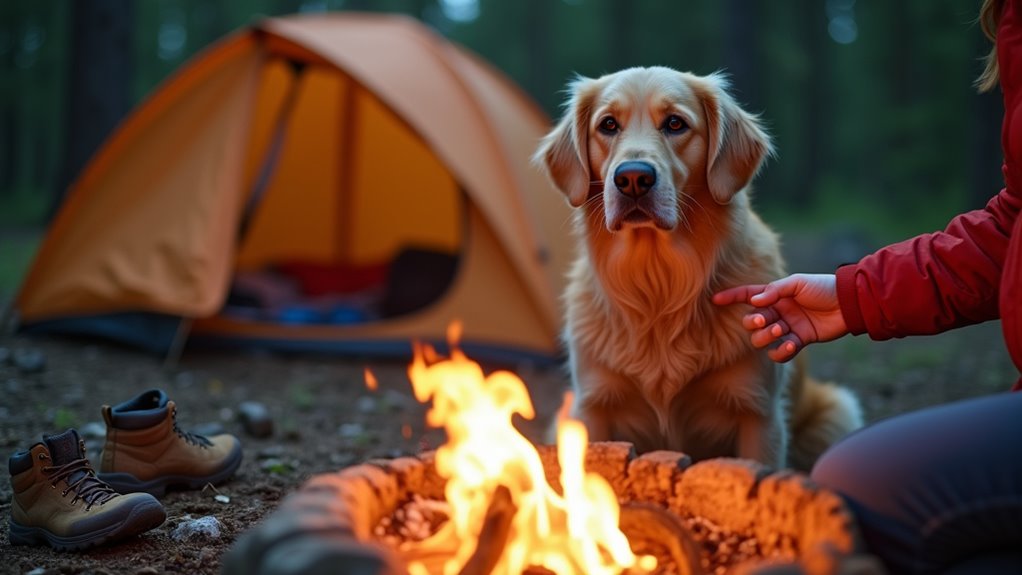
When you bring your dog camping, you’ll discover moments of pure magic—watching them explore new trails beside you, sharing quiet evenings by the campfire, and experiencing nature through their enthusiastic eyes. These adventures strengthen your bond in ways daily walks can’t match.
Camping with your dog creates magical bonding moments that transform ordinary nature experiences into unforgettable shared adventures together.
You’ll witness their personality shine as they navigate unfamiliar terrain and encounter new scents.
However, this enhanced connection comes with relentless vigilance. You can’t simply relax and unwind when your dog needs constant monitoring. Wild animals, toxic plants, and other campers pose real threats. Your attention splits between enjoying nature and ensuring your pet’s safety.
Every moment requires awareness—from preventing them from drinking contaminated water to stopping midnight explorations. The responsibility never stops, even when you desperately need rest. Following proper camping etiquette becomes even more crucial when you’re responsible for a pet that could disturb other campers’ peaceful outdoor experience.
Your dog transforms into a natural alarm system the moment you arrive at camp, alerting you to approaching wildlife, strangers, or unusual sounds that might signal danger. This built-in security gives you peace of mind while sleeping outdoors, especially in remote locations where help isn’t readily available.
Your furry companion’s keen senses detect threats long before you would.
However, your protective pooch can become a noise nuisance for fellow campers. Dogs often bark at raccoons rummaging through trash, owls hooting, or other campers returning late from evening activities. What seems like normal camping sounds to humans triggers your dog’s alert instincts.
You’ll need to balance your pet’s protective nature with campground courtesy, potentially requiring training or crate time to prevent disrupting others’ outdoor experiences. For camping enthusiasts who enjoy rock climbing adventures, having a well-trained dog can enhance both safety and enjoyment of the experience.
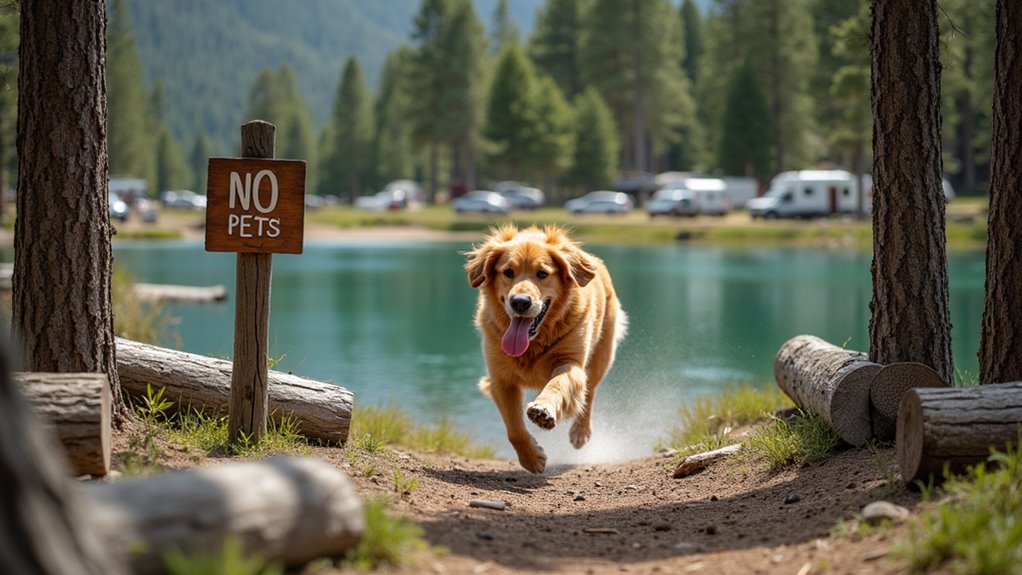
Beyond the security considerations, bringing your dog camping opens up incredible opportunities for shared outdoor adventures. Your four-legged companion becomes the perfect hiking buddy, motivating you to explore trails you might’ve skipped alone. Dogs naturally encourage more physical activity, turning lazy camping days into energetic outdoor excursions. They’re enthusiastic about discovering new scents, sights, and terrain alongside you.
However, this adventure partnership comes with significant limitations. Many campgrounds don’t allow pets, immediately shrinking your destination options. Dog-friendly sites often fill up faster and cost more. You’ll need to research pet policies, leash requirements, and nearby veterinary services before booking.
Some prime camping locations—like national parks—have strict no-pet rules on trails. This means you’ll miss out on spectacular hiking opportunities that drew you to those areas initially. Despite these challenges, family camping with your dog creates unforgettable bonding experiences that strengthen relationships between all family members.
While your dog’s presence naturally reduces camping stress through companionship and calming effects, outdoor weather poses serious health risks you can’t ignore.
Your furry friend’s comforting presence helps lower cortisol levels and provides emotional support during unfamiliar camping situations. Dogs naturally ease anxiety through their playful nature and unconditional affection, making wilderness experiences more enjoyable and relaxing.
However, weather extremes threaten your pet’s well-being considerably. Hot temperatures cause heatstroke, dehydration, and burned paw pads on scorching surfaces. Cold weather brings hypothermia risks, especially for short-haired breeds.
Sudden storms create panic and disorientation in dogs unfamiliar with camping environments.
You’ll need proper gear like cooling mats, insulated blankets, and weatherproof shelter to protect your companion. Monitor your dog constantly for signs of distress, panting, or shivering to prevent weather-related emergencies.
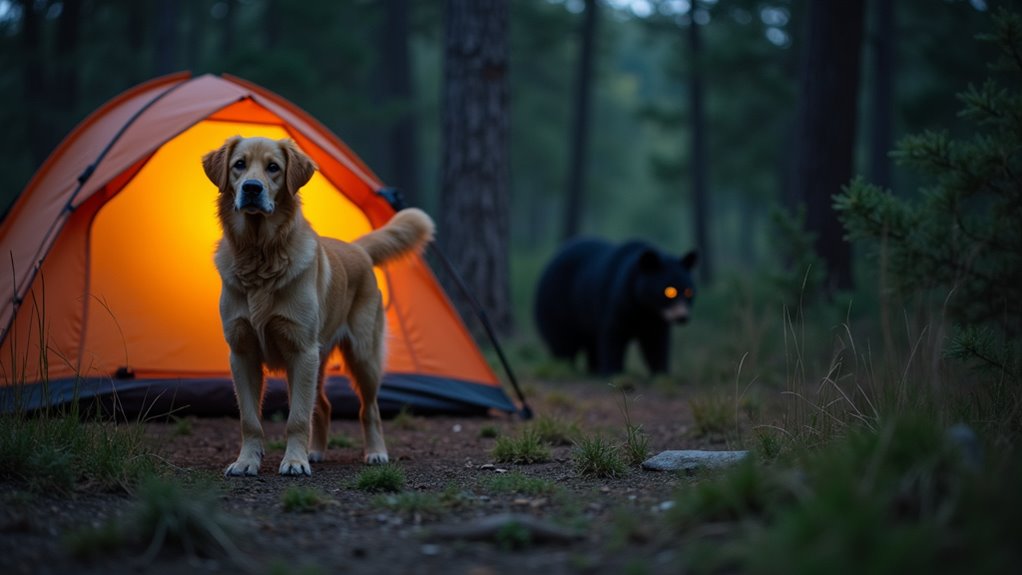
Dogs serve as natural wildlife deterrents through their scent and barking, yet they can simultaneously attract dangerous animals to your campsite. Your dog’s presence can effectively scare away smaller animals like raccoons, squirrels, and even deer that might otherwise raid your food supplies or damage your gear.
Dogs act as double-edged camping companions, deterring small wildlife while potentially attracting larger, more dangerous predators to your site.
However, your pet’s scent markings and food can draw predators like bears, coyotes, or mountain lions to investigate. Dogs often chase wildlife, potentially separating mother animals from their young and creating aggressive confrontations.
Your barking dog might also attract territorial animals rather than deterring them.
You’ll need to keep your dog leashed, store pet food securely, and clean up waste immediately. Research the specific wildlife in your camping area beforehand to understand whether bringing your dog creates more protection or danger. If you’re planning water activities like canoeing during your camping trip, ensure your dog has proper safety equipment and swimming abilities before venturing onto the water.
Although your dog can boost your camping motivation by creating enjoyable shared experiences and maintaining familiar routines, you’ll face significant equipment and space constraints that complicate trip planning.
Your dog’s enthusiasm for outdoor adventures naturally increases your own excitement about camping trips. They’ll maintain their regular walk schedule, encouraging you to stay active and explore trails you might otherwise skip. Having your furry companion creates memorable bonding moments around the campfire.
However, you’ll need extra gear like dog beds, food bowls, leashes, waste bags, and additional food supplies. Your vehicle’s storage capacity becomes strained, forcing difficult decisions about what human gear to leave behind. Tent space shrinks considerably when accommodating a dog, especially larger breeds.
You’ll also need backup plans for weather protection and secure tethering systems. Following proven strategies for family camping can help you better organize your space and equipment to accommodate both human and canine needs.
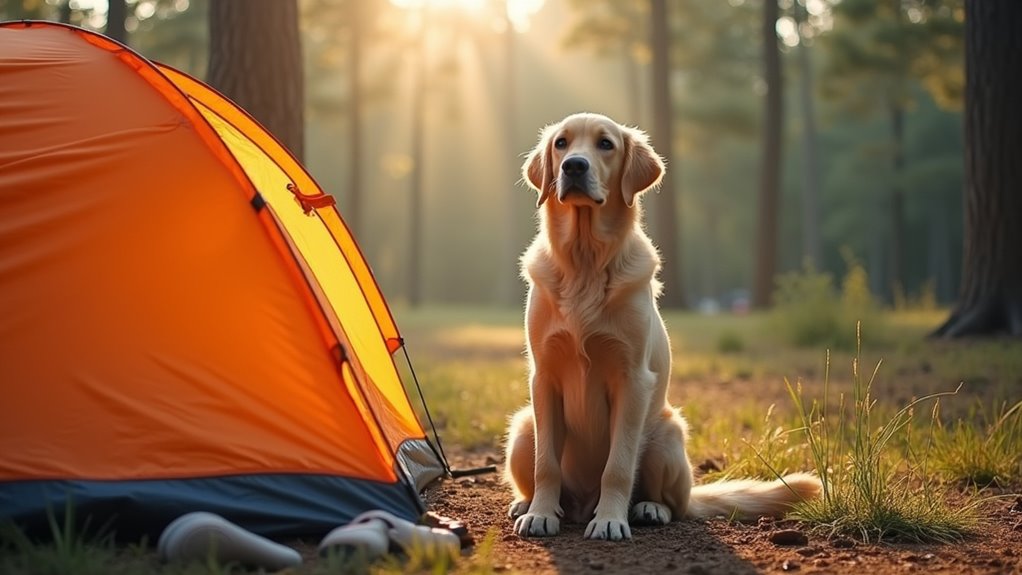
Camping environments present your dog with countless chances to meet new people and other pets, potentially enhancing their social skills and confidence. You’ll find campgrounds bustling with families, children, and fellow dog owners who often welcome friendly interactions. These encounters can help timid dogs become more outgoing and reinforce good manners in social settings.
However, new environments can trigger unexpected behavioral issues. Your normally calm dog might become anxious, reactive, or overly excited around unfamiliar sights, sounds, and smells. Wildlife scents, other animals, and constant activity can overwhelm even well-trained pets.
You’ll need to monitor your dog’s stress levels carefully and be prepared to manage barking, pulling, or territorial behaviors that could disturb other campers and create uncomfortable situations for everyone involved. Before heading out, consider what items to leave at home to avoid bringing unnecessary complications that could worsen your dog’s behavioral challenges in the camping environment.
When wilderness adventures turn dangerous or medical emergencies strike, your four-legged companion can provide invaluable emotional support and even practical assistance during critical moments. Dogs can alert others to your distress, fetch help, or simply keep you calm and warm during frightening situations. Their presence reduces anxiety and provides comfort when you’re injured or lost.
However, remote camping locations present serious veterinary care challenges. If your dog gets injured, bitten by wildlife, or ingests something toxic, you’re often hours away from professional help. You’ll need extensive first-aid knowledge and supplies for both human and canine emergencies.
Consider that your dog’s medical crisis could force you to abandon your trip entirely, potentially putting both of you at greater risk during an emergency evacuation. In mosquito-heavy camping areas, mosquito nets become essential protective gear for both you and your pet to prevent disease transmission.
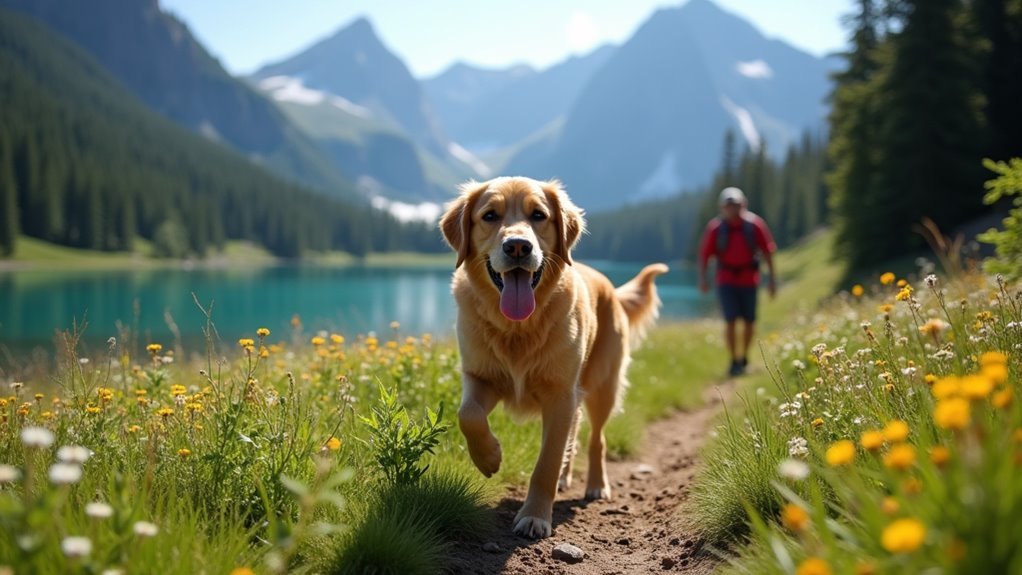
Your dog’s natural curiosity and energy can transform ordinary hikes into exciting adventures, leading you to discover hidden trails, interesting scents, and wildlife tracks you’d never notice on your own. Dogs encourage more frequent walks and longer explorations, helping you experience nature’s details through their heightened senses.
However, this enthusiasm creates Leave No Trace challenges. Your dog might trample fragile vegetation, disturb wildlife nests, or chase animals away from their natural habitats. They’ll dig holes, scatter leaves, and leave waste that you must properly dispose of.
Even well-trained dogs can inadvertently damage ecosystems by wandering off designated trails or rolling in sensitive areas. You’ll need constant vigilance to balance your pet’s natural instincts with environmental responsibility. If you’re considering winter camping with your dog, the challenges of maintaining Leave No Trace principles become even more complex in harsh weather conditions.
Since dogs provide hours of natural entertainment through their playful antics and companionship, you’ll find yourself needing fewer expensive activities or gear to stay occupied during downtime at camp. Your dog becomes free entertainment—watching them explore, playing fetch, or simply enjoying their enthusiasm for new sights and smells.
However, bringing your dog creates genuine additional expenses. You’ll need specialized camping gear like portable water bowls, dog sleeping pads, and tie-out stakes.
Many campgrounds charge pet fees ranging from $5-15 per night. You’ll also need extra food, waste bags, and potentially emergency vet funds for injuries from rough terrain or wildlife encounters.
Plus, you should budget for potential veterinary costs if your dog gets injured during severe weather events, as thunderstorms can pose serious risks to pets at campsites.
While your dog saves money on entertainment, the added equipment, fees, and preparation costs often outweigh those savings considerably.
Camping with your canine companion creates countless cherished memories, but careful consideration’s vital. You’ll discover delightful adventures and deeper bonds, yet face potential problems and planning pressures. Whether you’re seeking security and socialization or worried about weather woes and wildlife encounters, success depends on smart preparation. Don’t let drawbacks deter you—with proper planning and patience, you’ll find fantastic fun awaits. Balance benefits against burdens, and you’ll make memories that’ll last lifetimes with your loyal four-legged friend.